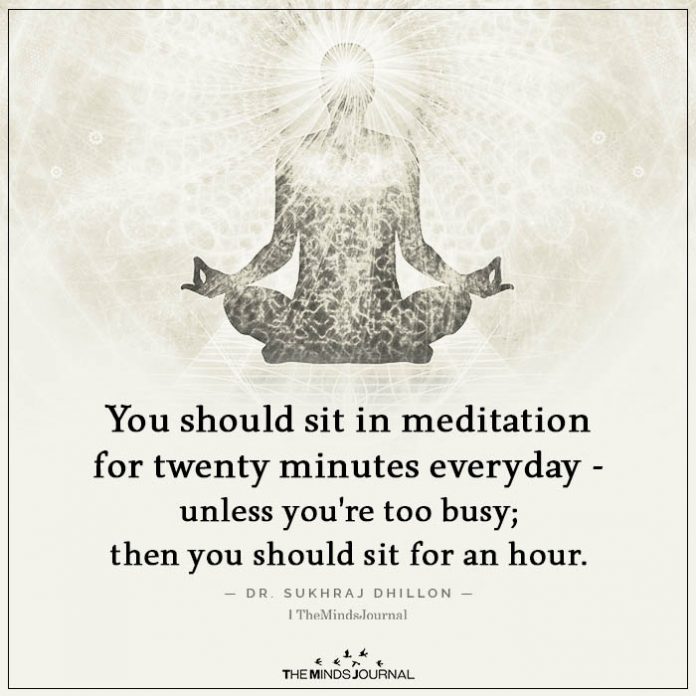While meditation is surrounded by religion, beliefs, and superstitions, it is a valid body state like any other, such as arousal or sleep. By learning steps to meditate, you can reap the benefits of this body state which include relaxation, energy, and perspective on your life.
Meditation is being taken seriously by health researchers interested in stress reduction and methods to improve overall health.
Steps to Meditate for Health and fitness
Meditation is used by people interested in addressing conditions such as anxiety, pain, depression, emotional problems, insomnia, and stress. Meditation is also the ultimate brain workout. Here’s how to get started.
1. Sit
Find a place where you can sit comfortably, uninterrupted for about 20 minutes. The most important thing is to sit with your back as straight as possible. Some people find that sitting on the edge of a cushion helps keep the back straight.
You will hear about special meditation cushions, candles, incense, statues, bells, and so forth — don’t worry about any of that stuff. The important thing is to sit comfortably and to practice meditation often. You can add accessories whenever you want.
Related: 4 Tips For Better Mental Health Through Nutrition
2. Set a Timer
At times when you are meditating, you may secretly be looking for any excuse to get up and do something else. One of the most compelling excuses is to “check the time.” Often during meditation, your sense of timing is lost and that leads to the feeling that you have gone past the time you set for meditation. This will often happen after you have been sitting for 1 or 2 minutes.
A timer helps to assure you that you have not meditated too long. If you do not have a timer, you will probably look at a clock or your watch every 30 seconds.
Set a timer and then forget about time while meditating.
3. Breathe
Breathing is a unique bodily function. It is automatic, we take over 10 million breaths per year without noticing, but we can also control breathing voluntarily. Think of breathing as to how we can communicate with our bodies. If we breathe slowly, our bodies relax. While you sit:
This is your only task in meditation — be aware of your breath. If your thoughts wander, just come back to breathing.
- Bring your attention to your breathing
- Notice everything about your breathing: the inhale, the exhale, and the tiny pause between them
- Breathe naturally, just be aware of your breath
Related: 20+ Best Meditation Music For Relief From Stress and Anxiety
4. Label
The goal of meditation is not to have no thoughts (that is impossible) but to not interact with the thoughts that occur. If, while you are meditating, you start wondering when was the last time you changed the oil in your car, that is perfectly normal — just come back to your breathing and try not to ‘chase’ the thought.
Some people find it helps to label the thoughts. When you notice yourself drifting, just place a neutral label on the thoughts — if you are thinking about everything you have to do at work, label the thoughts ‘work’ and return to breathing.
5. Don’t Judge
Meditation is hard and perfect meditation is impossible. Your thoughts will drift. You will find that on some days you spend your entire meditation time thinking about your kitchen sink. Your awareness will drift away and the time will disappear. That is fine.
Whenever you drift, come back to being aware of sitting and breathing. Do not judge yourself. Do not create a train of thought about how you can’t meditate, how you are no good at this. Just come back to your breath.
6. Ignore the Voices in Your Head
While you meditate, there is a little voice inside your head trying to get you to stop.
Don’t listen to the voice. While you are meditating, there is nothing more important for you to do. Just sit.
- This voice will come up with “great ideas” that you just have to write down immediately.
- The voice will read your to-do list to you, leaving you feeling pressured to just stop and get something done.
- The voice will, at least once, utterly convince you that your timer has stopped and you have been meditating for hours and are late for something.
Related: Meditation and Yoga Can Reverse DNA Reactions Which Cause Stress
7. Watch the “Thought Clouds” Drift
Treat meditation as an experiment. Watch yourself thinking. Examine how thoughts emerge randomly and then begin to connect to other thoughts. Watch what happens to thought if you do not nourish them. How do trains of thought stop?
Eventually, you will see that most thoughts are random and not really worth your time. You will also begin to develop an awareness apart from your thoughts. Perhaps the greatest lesson of meditation is that you are not your thoughts.
How to Incorporate a Meditation Practice in Your Daily Life

Many of the skills learned in meditation can be applied to your daily life. Take a two-minute breathing break several times during the day. Watch as your thoughts and ideas turn up at work, in conversation, or while you are solving a problem. Use the same experimental mindset and watch how you behave and think throughout the day.
- Waiting in line
- Doing the dishes
- Feeling upset
Meditation is a skill that needs practice and more practice. Set a daily time for meditation and stick to it. Your brain will benefit from the endlessly fascinating journey into your own mind. Your body will benefit from the deep relaxation and stress reduction
If you find the steps to meditate for health helpful, let us know in comments. Feel free to share it with your friends and loved one who wants to practice meditation for brain health and fitness.
Written by: Mark Stibich, PhD
Originally appeared on: Verywellmind.com
Republished with permission.










Leave a Reply